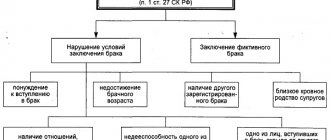Almost any civil law contract can be challenged. In a number of cases, they try to prove the invalidity of the loan agreement (in terms of accrual of interest, penalties), which makes it possible to get rid of illegally accrued penalties, etc.
Grounds for invalidating a loan agreement
The norms of the Civil Code of the Russian Federation impose a number of general requirements for any transaction concluded on the territory of the Russian Federation. For example, the parties must:
- reach the age of majority;
- have legal capacity and capacity;
- comply with the law when concluding a transaction;
- be free to express their will when signing an agreement.
If at least one of the parties ignores these legal requirements, the transaction becomes voidable. That is, the party to the contract or other interested parties have the right to file a lawsuit to declare the transaction invalid. Such recognition makes it possible to return to the position in which the parties to the transaction were before the conclusion of the agreement (that is, everything received under the agreement must be returned back).
If both parties violate the provisions of the law (for example, by concluding a loan agreement, organizing a fictitious transaction or disguising it as another transaction), then such an agreement will obviously be void. That is, it will not give rise to any legal consequences at all.
How to protect your rights in court
Improper fulfillment of obligations is always accompanied by financial losses. To minimize such costs, parties to a contract often abuse their rights and go to court to terminate the legal existence of the transaction. For example, in order to reduce the amount of penalties, customers recognize the contract as not concluded; this procedure has a general judicial procedure. To do this, you must adhere to the following steps:
- Draw up a statement of claim, substantiating your arguments with evidence.
- Send all documents to the court by mail, by hand, or in the form of an electronic document.
- Take part in the preliminary court hearing, presenting your information on the case.
- Take part in a court hearing, at the end of which a court decision will be made to recognize the contract as not concluded or to refuse to satisfy the claims.
- Wait until the judicial act comes into force and receive a writ of execution.
- Send a writ of execution to the bailiff service if the defendant refuses to voluntarily satisfy the claims.
Articles 168 – 171, 173 – 174.1, 176 – 179 of the Civil Code of the Russian Federation are used as the legal basis to recognize a contract as not concluded; Judicial practice on the disputes under consideration is published on the official website in the e-justice system.
On what grounds can you challenge a loan agreement?
There are more than a dozen potential grounds on which a loan agreement can be challenged. All of them are listed in Art. 168-179 Civil Code of the Russian Federation. We divided them into three groups:
- Vices of the participants in the transaction. One of the parties to the loan agreement (no matter whether we are talking about a citizen or a legal entity) did not have the right to enter into such a transaction or did so in violation of the procedure provided for in such cases. If we are talking about citizens, then, for example, a transaction was made by a minor or a person with limited legal capacity without the approval of his legal representative. And if the transaction is made by a child under 14 years of age or an incapacitated citizen, then such a loan agreement will be void. Defects of the subject may also occur if an organization participates in the transaction. For example, an organization may not have the right to enter into loan agreements due to the requirements of its constituent documents, or the permission of the founders is required to enter into such agreements, but it has not been obtained.
- Vices of the will of the participants in the transaction. We are talking about the situations listed in Art. 178 and 179 of the Civil Code of the Russian Federation, when the right of the parties to free expression of will is violated when concluding a loan agreement. This, for example, is the use of violence against a counterparty in order to conclude a transaction, the threat of its use, deception, or the use of extremely difficult circumstances of the injured party.
- Presence of violations of the law when concluding a transaction.
So, for example, paragraph 7 of Art. 807 of the Civil Code of the Russian Federation determines that if a loan is issued to a citizen and is not related to entrepreneurial activity, then such a loan must be issued taking into account the requirements of the Law “On Consumer Credit (Loan)” dated December 21, 2013 No. 353-FZ. However, the contractual provisions and requirements of this law are ignored.
Appeal
If a participant in the case does not agree with the decision made by the court, then he has the right to file an appeal. All parties to the case also have this opportunity. The procedure for appealing an appeal is prescribed in Chapter 39 of the Civil Code of the Russian Federation:
- The appeal is filed in the same court in which the claim was heard. But the decision lies with a higher authority;
- An appeal may be filed within one month from the date of the decision;
- The complaint must contain evidence and facts that cannot be presented to a lower judicial body. In addition, the decision of the lower court is checked for compliance with the law.
From all of the above, we can conclude that in order to declare a loan agreement invalid, it is necessary to apply to a magistrates or federal court. The grounds for appeal can be both general legal and special, which are valid only in relation to this type of agreement.
If you decide that you need to invalidate the loan agreement, or you need to prove its invalidity, we advise you to contact us. Properly drafting a claim, collecting evidence, and representing the client’s interests in court is the task of our lawyers. Solving the problem on your own may subsequently lead to the court simply rejecting the complaint.
We also provide other services in arbitration cases - please contact us!
Who can initiate the procedure for invalidating a contract?
The rules are spelled out in Art. 166 of the Civil Code of the Russian Federation. The following have the right to challenge the transaction:
- its party, i.e. the lender or borrower;
- another person to whom such a right is granted by law - we are primarily talking about those who have the right to act in the interests of the parties by virtue of the law (parents of minors, guardians), as well as for whom the completed transaction creates unfavorable consequences.
A prerequisite for challenging a transaction must be a violation by its terms of the rights and legitimate interests of a particular person or organization or the presence of other adverse consequences for them.
The following circumstances may be used to substantiate a claim for recognition of a contract as not concluded:
- The parties did not stipulate in the agreement all its essential terms (clause 1 of Article 432 of the Civil Code of the Russian Federation).
- The thing or the document of title to it has not been transferred if the law stipulates the conclusion of an agreement with such transfer (Clause 2 of Article 433 of the Civil Code of the Russian Federation).
- There is no state registration of the transaction if it is mandatory (clause 3 of Article 433 of the Civil Code of the Russian Federation).
IMPORTANT! If necessary, return the property or money transferred under an unconcluded transaction, the provisions of Art. 167 of the Civil Code of the Russian Federation are not used. Here it makes sense to refer to the rules of law on unjust enrichment (see Article 1102 of the Civil Code of the Russian Federation).
When going to court on the above grounds, it is advisable to take into account the following points. The invalidity of a contract is different from declaring it unconcluded. An agreement in which essential terms are not agreed upon may be contested as not concluded. Such a transaction is considered non-existent and, therefore, does not give rise to any consequences. In this regard, as a general rule, it does not make sense to claim in a lawsuit the consequences of the invalidity of a transaction.
IMPORTANT! If there is no mandatory state registration of the agreement, it is considered not concluded for third parties, but not for the parties to the agreement. At the same time, such an unconcluded agreement may be declared invalid on an independent basis, that is, not due to the lack of state registration (clause 2 of the information letter of the Supreme Arbitration Court of the Russian Federation dated February 25, 2014 No. 165).
Choosing a method of protecting the right: the difference between declaring a contract not concluded and declaring it invalid
Before you begin to draw up the said claim, you need to understand whether it is such or whether it is necessary to recognize the contract as invalid.
You can learn about the features of the latter in the article “Statement of Claim for Recognizing a Transaction as Invalid.”
Concepts that seem to be identical at first glance are actually fundamentally different:
- Unconcluded contracts are transactions that did not take place due to the fact that the parties did not fulfill the general conditions necessary for their completion.
- Invalid contracts are transactions made by the parties, but with so-called defects (subject, content, etc.), the list of which is established by law, for example in Art. 168–179 of the Civil Code of the Russian Federation.
Thus, an invalid contract exists, but by force of law cannot be recognized as entailing the usual legal consequences for a contract. An unconcluded agreement actually does not exist.
Grounds for refusal to satisfy a claim
Common grounds for refusing to satisfy a claim in this category of cases are:
- Lack of material and legal interest on the part of the plaintiff (this is often found among plaintiffs who are not a party to the transaction). In this case, the very adoption of a claim is possible only if the plaintiff has evidence of a violation of his rights by the disputed transaction. Moreover, even if the plaintiff has such evidence, he cannot file a counterclaim within the framework of an already existing process with the participation of only one of the parties to the disputed transaction. Thus, the Arbitration Court of the Moscow District, in a ruling dated April 28, 2015 in case No. A40-28840/14, confirmed the impossibility of considering the defendant’s counterclaim to recognize the assignment agreement as not concluded together with the initial claim for debt collection.
- A deliberately weak substantiation of the legal position on non-conclusion, for example, the absence of a deadline for fulfilling the obligation in the agreement. In this situation, you must always remember the presence of Art. 314 of the Civil Code of the Russian Federation, which allows you to determine the period when the parties for some reason did not do this themselves.
- Filing a claim to declare a contract void in order to avoid the plaintiff from fulfilling his contractual obligations, i.e., actual abuse of right.
Thus, when drawing up a claim for recognition of a contract as not concluded, it is worth paying attention to the legal grounds (whether they entail recognition of the contract as not concluded or invalid and for which category of persons, whether they confirm the substantive interest of the plaintiff). You should not file such a claim in order to avoid fulfilling a contractual obligation: having identified the fact of abuse of rights, the court will reject the claim.
Step by step procedure
A voidable transaction can only be declared invalid on the basis of a court decision.
The step-by-step procedure for recognizing a loan agreement as such looks like this:
- Conducting a check to determine whether there are grounds for declaring a transaction invalid. At this stage, it is necessary to collect evidence for the court confirming the existence of grounds on which the transaction can be declared invalid.
- Preparing a statement of claim and going to court. The claim is filed according to the general rules of claim proceedings in accordance with the requirements of Art. 131 and 132 of the Code of Civil Procedure of the Russian Federation. The defendant in the claim is usually the counterparty under the loan agreement, therefore, the claim is filed at the place of his registration (residence).
- Obtaining a court decision declaring the transaction invalid.
Legal consequences of recognizing a loan as void
Before filing a claim, the borrower should weigh the pros and cons of such a decision. If there is a court decision, it will not only get rid of unwanted demands.
Most often, you have to repay the loan in full. Whether it is a sum of money or valuables, they are usually transferred back, as it was before the conclusion of the contractual relationship.
If there is no return, the plaintiff may switch places with the defendant. And then a claim will be filed for forced collection of the “body” of the debt, including seizure of accounts and property, filing of a writ of execution at the place of work.
What should the application contain?
The content, as well as the form of legal claims, are regulated by Article 131 of the Code of Civil Procedure of the Russian Federation. This rule of law lists the mandatory provisions that must be indicated in the application. These include:
- Name of the court where the claim is filed.
- Full name, address of the plaintiff.
- Full name and address of the representative, if the claim is filed by the representative.
- Information about the defendant. Such information includes his full name and address (must be indicated), as well as date of birth, place of birth, place of work (indicated if known).
- Also, Article 131 of the Civil Procedure Code provides for the indication of one of the defendant’s identifiers, if they are known. This may be TIN, series, passport number, etc.
- The plaintiff must also indicate how his rights were violated.
- The plaintiff's demand is to recognize the contract as not concluded.
- The circumstances of the case with evidence that confirms these circumstances.
- Cost of claim (for property claims).
- Has a claim been previously sent to the defendant?
- Documents attached to the lawsuit (list).
- Date signature.
It is also recommended that the claim include information about the telephone, fax, and email numbers of the parties.







